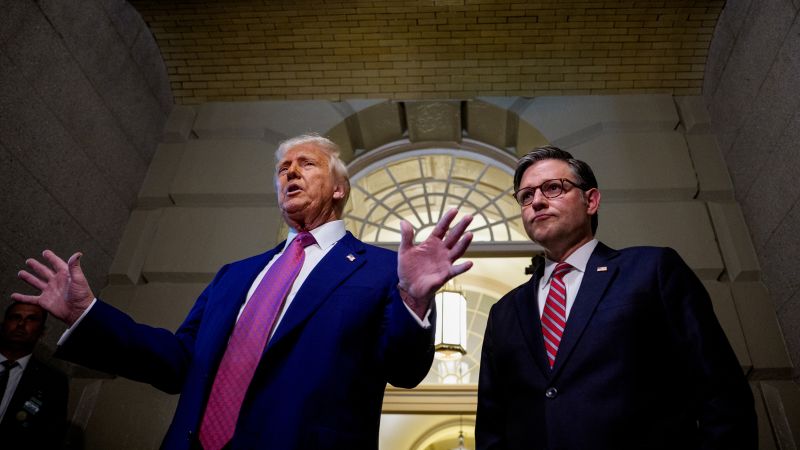The influence of PresidentDonald Trumpand Speaker Mike Johnson will once again be put to the test Wednesday, as GOP leaders look to deliver the president his first legislative win by the July Fourth holiday.
The challenge: The newly Senate-approved legislation has to move through the deeply divided House untouched to meet the self-imposed deadline.
TheSenate’s passage of the billTuesday was a hard-fought victory for Trump, who spent days wrangling fellow Republicans behind the multi-trillion-dollar bill, which includes tax cuts and funding boosts for the Pentagon and border security. It also includes more contentious spending cuts to pay for the rest of the bill, including the biggest downsizing of the federal safety net in decades.
Across the Capitol, House GOP leaders are confident the latest version can pass the House, according to multiple sources. But it will likely take significant political muscle, with dozens of House members still grumbling about the Senate’s significant changes to the bill, including as recently as Tuesday morning, minutes before passage.
Asin the Senate, House Speaker Mike Johnson can only afford to lose three votes. And Johnson is grappling with his own high-stakes battle between centrists and right-wing hardliners.
It all amounts to a pivotal week that could define Trump’ second term: So far, the push to pass his agenda in Congress has been marred by weeks of tense GOP infighting that has even some Republicans worried about how the bill could play in the 2026 midterms.
Yet if it passes next out of the House, Trump and his Hill allies believe it will help cement his legacy on issues like border security and tax policy – including fulfilling his campaign promises of no taxes on tips or overtime pay – while attempting to rein in federal spending by instituting work requirements for able-bodied adults for Medicaid and SNAP.
The legislative brawl inside the US Capitol has also included some dramatic moments – including over the weekend when a key Republican, Sen. Thom Tillis, stunned Washington by announcinghe would not seek reelectionafter defying Trump and voting to block his bill on the floor. (Within a day of Trump threatening to primary him, Tillis exited the race altogether.)
Those high-stakes moments will likely continue on Capitol Hill when the House returns Wednesday. Johnson is already confronting consternation across his ranks about the final product, raising questions about the fate of the Senate’s version in his chamber.
Before the bill can come to a final passage vote in the House, the chamber must first take a key procedural vote known as a vote on the rule – and some conservative are threatening to rebel against it, creating a new headache for the speaker.
The House Rules Committee voted to advance the rule on Trump’s agenda bill in the early hours of Wednesday morning after the panel met for almost 12 hours.
GOP Reps. Ralph Norman and Chip Roy, two conservatives who have harshly criticized the Senate’s version of the package, joined Democrats on the panel to oppose advancing the rule.
The speaker held a call Monday afternoon with one of Trump’s top medical advisers, Dr. Mehmet Oz, and a group of more centrist-leaning Republicans known as the Republican Main Street Caucus, who have been uneasy about the Senate’s package and its health provisions, according to two people familiar with the discussions.
“There is a lot of angst and frustration,” one person said, describing the mood of many members in the Main Street Caucus.
House GOP centrists also have to deal with other new provisions from the Senate, such as language to strip Medicaid funding from Planned Parenthood for the next year – a long- sought goal of social conservatives in Congress but one that has drawn ire from centrists.
The more moderate Republicans aren’t Johnson’s only math problem in the House. He must also win over House GOP hardliners like Rep. Chip Roy, who have publicly complained the bill doesn’t go far enough in reducing the US deficit.
As of Tuesday evening, House Republican and Democratic leaders were furiously working to get their members to Washington ahead of the pivotal floor vote on Trump’s agenda, with margins so tight that a single absence could potentially determine its fate.
Storms across the East Coast canceled or delayed flights for at least a handful of members with some lawmakers posting on X to say they had flights back to DC canceled and were scrambling to find a way to get back for the vote.
Johnson acknowledged to reporters Tuesday night that flight delays and the weather were a concern for attendance. “We’re monitoring the weather closely. We have to figure that out,” he said. Asked if he thinks everyone can get in town in time to kick off votes in the morning, Johnson added, “We’re not sure yet. There’s a lot of delays right now, so that’s part of the problem.”
CNN’s Morgan Rimmer contributed to this report.
